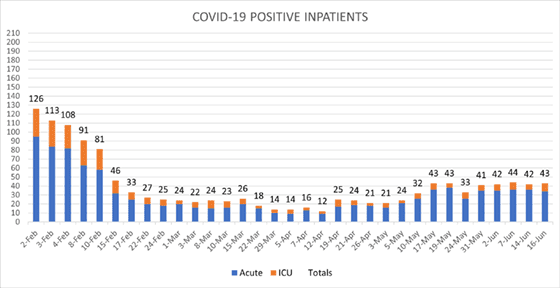Quick Read:
- King County’s counts and transmission rates continue to decline but still remain very, very high.
- When you have symptoms of respiratory illness, at-home antigen tests should be repeated over the course of several days. A negative antigen test result does not mean you don’t have COVID-19.
- UW Medicine is preparing to offer COVID-19 vaccines to children under 5 with authorization by the Centers for Disease Control and Prevention expected in the next few days.
It’s officially the season of “grads and dads” in our new normal: school is getting out, camps and vacations are starting, graduation ceremonies are happening, and Father’s Day is on Sunday. While there’s a lot to celebrate, all of this also leads to more large gatherings and more potential risk for COVID-19 transmission and infection, especially with so much rain keeping us indoors.
Case counts and transmission rates continue to decline locally, but still remain very, very high. At the same time, there is still overall inconsistency with the state of COVID-19 in the community, especially as new variants emerge more quickly than ever. From the changing levels of protection that immunization and prior infection provide, to the timing of COVID-19 antigen tests turning positive with symptoms of respiratory illness, not all cases are alike.
We must continue to adjust our behavior accordingly and take necessary precautions after potential virus exposure or with COVID-like symptoms. If you use an at-home antigen test, plan to test yourself multiple times over the course of several days as a negative antigen test result does not mean you don’t have COVID-19. Getting a PCR test, which is more sensitive, is another great option to ensure accuracy of infection status.
Remember that you and your family can get free COVID-19 tests through the government. Your insurance may also reimburse you for COVID-19 tests that you purchase. These resources will be helpful as UW Medicine, in alignment with CDC guidelines, is changing home quarantine policies. Employees with high-risk exposures (such as living with someone with COVID-19 in your household) are now allowed to continue working if you have no COVID-19 symptoms and a negative antigen or PCR test on days 1, 2 and 3 after exposure and a negative PCR test between days 5-7. Respirator use will be required during the surveillance testing period. Please remember to complete the exposure survey so the Employee Health Exposure Teams are aware and can track employee exposures and cases.
UW Medicine expects to move from contingency to conventional staffing when possible. At that time, there will be additional considerations, including home quarantine, for employees who are not up to date with their COVID-19 vaccines and boosters. More information on UW Medicine’s exposure policy is available here. As always, we greatly appreciate your cooperation with this policy, as well as your continued collaboration toward ensuring our patients, faculty, trainees and staff stay safe from COVID-19 at our hospitals and clinics.
UW Medicine COVID-19 Activity Summary

Local/National/Global Epidemiology
King County: Public Health – Seattle & King County is reporting 449,027 total cases and 2,857 deaths as of Wednesday, June 15. The number of new positive tests over the past seven days is currently at 312.8 per 100,000 people.
Washington: The Department of Health reports 1,622,214 cases and 13,084 deaths as of June 14.
United States: The Centers for Disease Control and Prevention reports 143,007 new cases, 85,825,048 total cases and 1,007,964 deaths as of June 15.
Global: The WHO COVID-19 Dashboard reports 535,248,141 confirmed COVID-19 cases and 6,313,229 deaths as of June 16.
With many businesses and public community spaces dropping COVID-19 protection requirements such as masking indoors and social distancing, it’s now our individual and shared responsibility to take precautions to avoid infection, reinfection, or spreading COVID-19. Vaccination and boosters remain the most effective safety measures to prevent serious illness and reduce community spread, but masking in indoor public spaces and paying attention to ventilation are also incredibly helpful.
The power of vaccines is why we’re eager for the U.S. Food & Drug Administration and the Centers for Disease Control and Prevention to authorize COVID-19 vaccination for children under 5, as young as six months. We expect approval of eligibility in the next few days and will keep everyone informed of where and how to get children in your household from this age group vaccinated. This is an exciting new development toward making COVID-19 vaccines accessible to all ages, and UW Medicine is pleased to support the effort in our community.
Thank you, as always, for all that you do. Sending healthy, happy wishes to all the grads and dads out there and to everyone who’s helping them celebrate this month!
Sincerely,
John Lynch, MD, MPH
Medical Director, Infection Prevention & Control
Associate Medical Director, Harborview Medical Center
Division of Allergy & Infectious Diseases, UW School of Medicine
